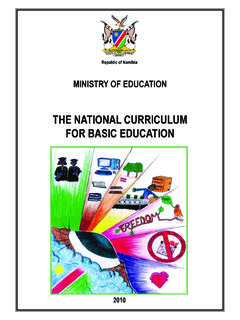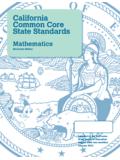Transcription of Getting practical - SCORE | Home
1 Getting practicalA framework for practical science in Our vision is that all children and young people will experience high quality practical work in science throughout their school careers It is important for children and young people to experience good quality practical science at school. But, what is practical work in science? Why is practical work in science such an essential part of a science education? What are the purposes of practical work? How, when and where should it be carried out, to maximise its effectiveness?
2 And how can the quality of practical work in science be improved?This booklet will help you to recognise and plan for a wide variety of high quality science practical work, ranging from out of the classroom learning to opportunities for students to practise specific techniques and you have read this booklet, you may like to look at the accompanying resources. These resources link the indicators of high quality practical work to selected biology, chemistry and physics activities for primary and secondary schools.
3 They are designed to help in a practical way, as you consider the issues raised in Getting practical .IntroductionGetting practical Getting practicalPractical work in science is a hands-on experience which prompts thinking about the world in which we live. It is made up of a core of two activity types: scientific techniques and procedures, both in the laboratory or the field, and; scientific enquiries and of these core activities not only supports the physical development of skills but also helps shape the understanding of scientific concepts and phenomena.
4 The hands-on approach offered by practical work often challenges students preconceived ideas and as a result deepens their scientific addition, teacher demonstrations are a valuable experience of practical work in science experience. They allow, for example, What? A definition of practical work in sciencestudents to gain first hand experience of more spectacular experiments. Demonstrations are also useful for modelling scientific procedure, thus enabling students to develop their own activitiesScientific understanding often progresses through the un-programmed event, so the real world cannot always be satisfactorily simulated on a computer screen.
5 Modelling therefore complements but doesn t replace practical work in science. Students should also have opportunities for a wide range of communication activities, including reading and writing of text, use of diagrams and interactive models, group discussions and role practicalTechniques and procedures Pupils engage in: using a wide range of equipment and handling materials and living things making observations, taking measurements working safelyPractical work in scienceTeacher demonstrations Teachers.
6 Use these to teach about complex or hazardous situations can then focus on process of enquiry are able to model the procedures and processes of scienceEnquiries and investigationsPupils engage in: using practical skills to undertake scientific enquiries and investigations asking questions and planning to answer these or test an idea collecting data systematically, analysing and interpreting data and evaluating their methods considering the validity and reliability of their evidence when drawing conclusions Getting practicalPractical work is not a part of science for its own sake but because.
7 Science is an empirical subject, learning is very often more effective when it incorporates hands-on experience, science contributes to increasing knowledge and conceptual The purposes of practical workAny particular piece of work needs to have its objectives made explicit to pupils if they are to benefit fully from it. Omitting this can lead to pupils experiencing practical work merely as a break from the more routine activities of listening and Development Planning Manipulation of equipment Observation Analysing EvaluatingExperiential Learning Test out own ideas Test out theories Develop problem solving strategies Develops team work and taking responsibility Develops students as self learnersIndependent Learning Students work at their own pace Students work at their own level Supports
8 Differentiation by outcome, task and questioning Builds student confidenceLearning in Different Ways Working in teams Working as individuals Manipulating materials and objects Observing using all senses Informal dialogue with peers and teachersThe development of Personal, Learning and Thinking Skills (PLTs) and How Science Works (HSW) practical Science Supports: Getting practicalAll high quality practical work will be: Integrated into all science long term schemes of learning so that most lessons will include some hands-on activity to provide a stimulating learning environment.
9 Well-planned through inclusion in medium term schemes of learning and lesson plans, so that resource provision and class management can be organised effectively. Adaptable to suit the range of classes and individual pupils. Hands-on activity will expose differences and the teacher needs to consider adaptations for variations in ability, prior experience, interest, motivation and behaviour. There must be explicit success criteria for differentiated activities. Time-efficient so that the tension between the time-consuming requirements of practical How, When, Where?
10 Recognising high quality practical workwork, where pupils think themselves into the task and develop practical skills, is balanced against the pressure of covering the curriculum quality of practical work experiences should be judged by the progress students make in their learning and measured against agreed success criteria. practical work should not be judged by the quantity of time spent on it. For example, complete investigations will probably be rare activities, as elements of the investigative process and of the practical techniques can be studied in shorter time periods.








